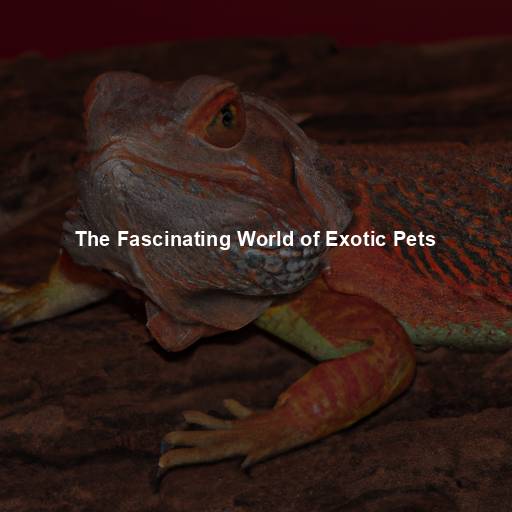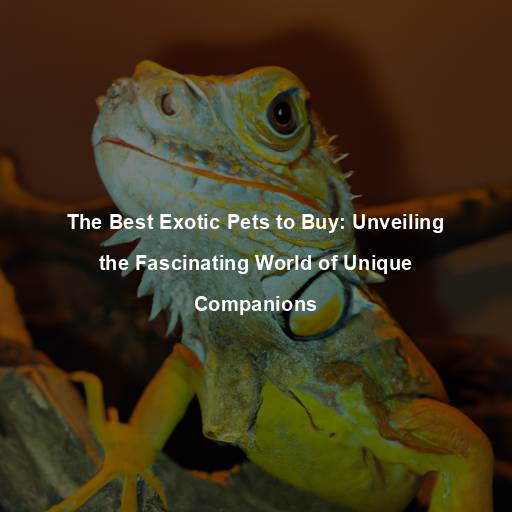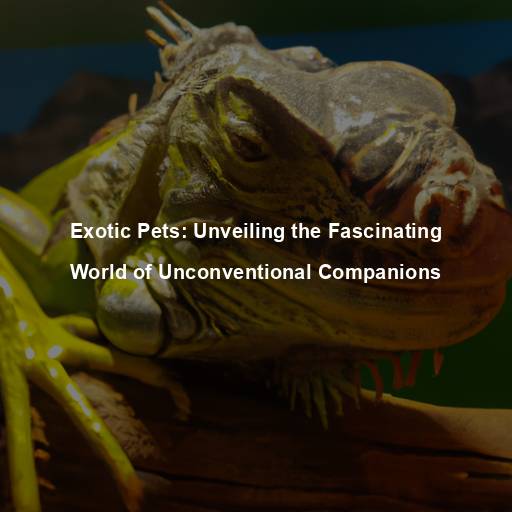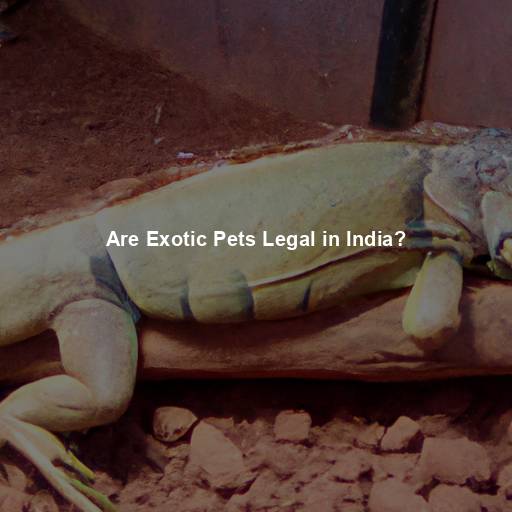Should Exotic Pets be Banned?
Last Updated on July 13, 2023 by Evan
Contents
- 1 The Fascination with Exotic Pets
- 1.1 The Appeal of Exotic Pets
- 1.2 The Dark Side of Exotic Pet Ownership
- 1.3 Arguments for a Ban on Exotic Pets
- 1.4 Arguments against a Ban on Exotic Pets
- 1.5 The Middle Ground: Regulation and Education
- 1.6 Balancing Individual Rights and Animal Welfare
- 1.7 The Need for Comprehensive Legislation
- 1.8 Enforcement and Inspection
- 1.9 Educating Potential Owners
- 1.10 Encouraging Adoption from Rescue Centers
- 1.11 International Cooperation
- 1.12 The Role of Sanctuaries and Conservation Organizations
- 1.13 Public Awareness and Responsible Ownership
- 2 A Multifaceted Issue Requiring Nuanced Solutions
- 3 The Human-Animal Bond and Ethical Considerations
- 4 FAQs – Should Exotic Pets be Banned?
- 4.1 What are exotic pets?
- 4.2 Why should exotic pets be banned?
- 4.3 Are there any benefits to keeping exotic pets?
- 4.4 Don’t exotic pets provide unique companionship?
- 4.5 How would banning exotic pets affect current owners?
- 4.6 Can’t exotic pets be regulated instead of being banned?
- 4.7 What about responsible owners who provide proper care for their exotic pets?
The Fascination with Exotic Pets
The fascinating allure of exotic pets has forever enchanted the hearts and minds of humankind. These extraordinary creatures, like the regal Bengal tiger and the vibrant tropical birds, possess an indescribable mystique that beckons us towards their allure. Yet, the enigma surrounding whether or not to ban such extraordinary companions ignites a fierce and fervent conversation amongst passionate animal activists, seasoned experts, and influential decision-makers. Within the realm of this article, we shall embark on a journey to unravel the intricate layers surrounding the ownership of exotic pets, immersing ourselves in the labyrinthine arguments that both advocate for and oppose a ban on these remarkable companions.
The Appeal of Exotic Pets
One cannot deny the allure of owning an exotic pet. The thrill of having a creature that stands out from the ordinary can be enticing. Exotic pets often possess striking physical characteristics, behaviors, and sounds that make them fascinating to observe. Additionally, some individuals are drawn to the idea of owning something rare and exclusive, a symbol of status and uniqueness.
The Dark Side of Exotic Pet Ownership
While the appeal of exotic pets is understandable, there are serious concerns associated with their ownership. One of the primary concerns is the welfare of these animals. Many exotic species have specific environmental and dietary needs that are challenging to meet in a domestic setting. The stress of captivity and improper care can lead to severe health issues and behavioral problems for these animals.
Another issue is the impact on wildlife conservation efforts. The exotic pet trade often involves the capture and smuggling of animals from their natural habitats, contributing to the decline of vulnerable species. It disrupts delicate ecosystems and threatens biodiversity. Additionally, when these pets are released or escape into the wild, they can become invasive species, wreaking havoc on local ecosystems.
Arguments for a Ban on Exotic Pets
The debate surrounding the prohibition of exotic pets continues to ignite passionate arguments from both sides. Advocates for a ban stress the importance of safeguarding animal welfare and maintaining the delicate balance of biodiversity. They assert that regardless of the owner’s good intentions, the inherent challenges of nurturing these unique creatures in captivity render it an improbable feat. Their goal in imposing these regulations is to deter the selfish exploitation of these majestic beings for individual gratification.
In the ongoing debate surrounding the ownership of exotic pets, those in favor of a ban express grave concerns about the inherent perils they present. Highlighting the potential dangers associated with species like powerful predatory felines, they shed light on the undeniable risk to public safety. It is an unfortunate reality that despite one’s intentions, unpredictable accidents can occur, and their repercussions can be nothing short of devastating. The proposition to prohibit the possession of these extraordinary animals is an earnest effort to diminish the possibility of human harm or even worse, loss of life.
Arguments against a Ban on Exotic Pets
In the realm of exotic pet ownership, voices opposing a blanket ban on these captivating creatures resound with a compelling argument. These proponents assert that fostering a culture of responsible ownership can immensely alleviate the concerns hovering over this controversial topic. Central to their stance is the firm belief that a foundation built upon education and stringent regulations is the pivotal solution for safeguarding the well-being of these enchanting animals. To materialize this vision, they advocate for a system of licensing requirements, mandatory training, and ongoing inspections, enforcing a culture of accountability amongst exotic pet guardians.
In an ever-evolving world, the advocates for exotic pets rise to the forefront, challenging the conventional notions of pet companionship. Their argument reverberates with a mystifying allure – that the connection between humans and animals transcends the boundaries set by traditional pets. These advocates beckon us to delve into the unknown, embracing the enigmatic charm of exotic pets, as they hold the key to cultivating a profound understanding of nature and conservation. In their intricate web of reasoning, they insist that responsible ownership of these captivating creatures can be a catalyst for heightened awareness and fervent efforts towards preserving our diverse wildlife.
The Middle Ground: Regulation and Education
The ongoing dispute surrounding the ownership of exotic pets remains as perplexing as ever, with conflicting arguments vying for attention. However, amidst this chaos, a glimmer of hope emerges in the form of a middle ground that acknowledges the importance of both regulation and education. By finding a delicate balance between individual freedoms and the welfare of these unique creatures, we can navigate the intricacies of this complex issue with a newfound sense of enlightenment.
In a world rife with perplexing questions and burstiness, there exists a pressing need for regulations to tame the chaotic terrain of exotic pet ownership. Empowering those who possess the knowledge and capability to provide the tender care and attention these enigmatic creatures deserve is paramount. By imposing the provision of licenses, comprehensive training programs, and regular inspections, we may glimpse a glimmer of hope in preventing the grim specter of mistreatment and neglect from hanging over our exotic companions. Furthermore, fostering a culture of awareness and education about the intricacies and weighty responsibilities of owning such extraordinary creatures can aid prospective owners in making well-informed decisions, steering clear of the precarious path of uncertainty.
Balancing Individual Rights and Animal Welfare
Navigating the intricate realm of regulating exotic pets poses a perplexing conundrum: how can we harmonize the divergent interests of animal welfare and individual rights? Striking a delicate balance entails upholding the wellbeing of these extraordinary creatures, while also acknowledging the genuine intent of responsible owners who diligently create suitable habitats for their exotic companions. Crafting a fair and comprehensive framework necessitates contemplative legislation and the implementation of robust enforcement mechanisms that honor the multifaceted nature of this complex issue.
The Need for Comprehensive Legislation
To effectively regulate exotic pet ownership, comprehensive legislation is essential. This legislation should include clear definitions of what constitutes an exotic pet, along with specific requirements for their care, housing, and transportation. It should also outline the licensing process, including the qualifications and responsibilities of potential owners. Additionally, the legislation should establish penalties for those who fail to meet the necessary standards or engage in illegal activities related to exotic pets.
Enforcement and Inspection
In the ever-evolving realm of regulatory frameworks, the crucial key to success lies in sturdy enforcement mechanisms. Delicate yet pivotal, regular inspections orchestrated by skilled professionals unveil a realm of possibilities in attaining compliance from exotic pet owners who find themselves within the confines of established guidelines. A comprehensive approach during these ethereal forays should encapsulate not just the animals’ mere physical well-being but extend its audacious gaze towards examining the adequacy of their habitats. By meticulously holding accountable these passionate pet enthusiasts while skillfully unearthing potential concerns, the gleaming efforts of enforcement and inspection tirelessly interlock to forge a formidable shield against the unspeakable atrocities of animal mistreatment and neglect.
Educating Potential Owners
Education plays a vital role in responsible exotic pet ownership. Potential owners should be provided with accurate and comprehensive information about the specific needs and requirements of the exotic species they intend to keep. This education should cover topics such as proper nutrition, habitat design, enrichment activities, and potential health issues. By equipping individuals with the necessary knowledge, they can make informed decisions about whether owning an exotic pet is suitable for them.
Encouraging Adoption from Rescue Centers
In a world where the allure of exotic pets can sometimes cloud our judgment, one simple solution emerges, like a phoenix rising from the ashes, to combat the perplexing issue of illegal trade and heightened demand. Enter the rescue centers, these havens for abandoned, confiscated, and mistreated exotic animals, beckoning us with their tales of resilience and survival. By embarking on a journey of enlightenment, spreading the word about the hidden gems awaiting adoption, we can unfurl a tapestry of compassion, nurturing a bond of companionship whilst simultaneously easing the weight carried by these sanctuaries of hope.
International Cooperation
The captivating allure of exotic pets knows no bounds, stretching far beyond the confines of any singular land or locale. A perplexing predicament of global proportions, it demands a synchrony of nations, a defiant dance of international solidarity. A harmonious symphony of tightened regulations and unwavering crackdowns must resonate across borders, shattering the insidious networks of illicit trafficking. It is through the sharing of knowledge, the tireless coordination of endeavors, and the establishment of unwavering standards that we may embark upon a valiant quest to safeguard the wellbeing of these extraordinary creatures on a worldwide scale.
The Role of Sanctuaries and Conservation Organizations
It’s no secret that sanctuaries and conservation organizations are doing some incredible work when it comes to the well-being and preservation of exotic animals. I mean, we’re talking about places that provide these poor creatures with a safe haven after they’ve been through some serious tough times – mistreatment, abandonment, even being yanked out of illegal trade. But it doesn’t stop there. These organizations are also passionate about protecting the natural habitats of endangered species, going above and beyond to ensure their survival.
Public Awareness and Responsible Ownership
Lastly, public awareness campaigns can play a crucial role in promoting responsible exotic pet ownership. These campaigns can highlight the challenges and responsibilities associated with owning exotic pets, emphasizing the need for proper care and adherence to regulations. By fostering a culture of responsible ownership and raising awareness about the potential consequences of neglect or mistreatment, we can strive towards a society that values the well-being of all animals.
A Multifaceted Issue Requiring Nuanced Solutions
The debate surrounding the banning of exotic pets is complex and multifaceted. It involves considerations of animal welfare, conservation, public safety, individual rights, and global cooperation. While a ban may seem like a straightforward solution, it fails to address the underlying issues and the potential unintended consequences it may bring. Instead, a comprehensive approach that combines regulation, education, enforcement, and awareness can provide a more nuanced solution.
In the complex realm of the exotic pet trade, a myriad of uncertainties loom over those with a vested interest in both the welfare of the animals and the rights of individuals. By delving into the intricacies of responsible ownership, implementing comprehensive legislation, ensuring rigorous enforcement, and fostering cooperation among all stakeholders, we embark on a journey towards safeguarding the well-being of these captivating creatures. In this perplexing landscape, we aspire to strike a delicate balance where our ardor for exotic pets thrives alongside the imperative of conservation.
Threats to Biodiversity
The exotic pet trade poses a significant threat to biodiversity and conservation efforts. Many of the species sought after as exotic pets are native to specific regions and play important roles in their respective ecosystems. The removal of these animals from their natural habitats can disrupt food chains, alter ecological dynamics, and contribute to the decline of vulnerable species. It also creates a lucrative market that incentivizes the illegal capture and smuggling of animals, further exacerbating the problem.
Invasive Species and Ecosystem Disruption
One of the most significant risks associated with the exotic pet trade is the introduction of invasive species into new environments. When these pets are released or escape into the wild, they can establish breeding populations and outcompete native species for resources. Invasive species can have devastating effects on local ecosystems, leading to declines in native biodiversity, changes in habitat structure, and even the extinction of endemic species. The Burmese python in the Florida Everglades is a prime example of the ecological damage caused by released exotic pets.
Challenges in Managing Invasive Species
Dealing with invasive species can feel like unraveling a never-ending puzzle. These tenacious creatures have a knack for establishing themselves in foreign territories, leaving locals in a state of perpetual bewilderment. Their ability to thrive without natural checks and balances only adds to the confusion. Moreover, the uphill battle of managing these invasions can drain precious conservation resources.
The Role of Conservation Breeding Programs
Conservation breeding programs can play a critical role in mitigating the impact of the exotic pet trade on wildlife conservation. These programs focus on breeding endangered or threatened species in controlled environments with the goal of reintroducing them into the wild. By prioritizing the preservation of species in their natural habitats and discouraging the demand for wild-caught animals, conservation breeding programs can help alleviate the pressures on wild populations.
Ethical Considerations of Captive Breeding
As we delve into the complexities of captive breeding programs, the ethical quandaries that arise cannot be overlooked. While these initiatives may serve as stepping stones in the realm of conservation, we must proceed with caution. Breeding animals in captivity should not become a mere facade that justifies the ongoing exploitation of wild and wondrous creatures for the pet trade. Instead, it is imperative that these programs operate within stringent ethical boundaries, placing the well-being and genetic richness of the animals at the core.
Balancing Conservation and Demand Reduction
Navigating the complex realm of exotic pet ownership demands a holistic and multifaceted approach. It necessitates a unique blend of conservation endeavors and techniques to curb the insatiable demand. Steering towards a brighter future, it becomes crucial to safeguard the fragile ecosystems that serve as homes to endangered species, clamping down on the illicit wildlife trade, and fostering sustainable measures. Furthermore, initiatives aiming to diminish the allure of exotic pets must encompass far-reaching awareness drives, educational initiatives, and reinforced regulatory frameworks.
The Human-Animal Bond and Ethical Considerations
The Profound Connection between Humans and Animals
There’s just something captivating about the innate kinship humans share with animals; it’s like an enigmatic force that pulls us together. We’ve all witnessed the undeniable power of this bond, as it transcends the conventional realm of domesticated companionship into the enchanting world of exotic pets. These unconventional creatures, with their wonder-inducing traits and eccentric quirks, have a way of forging connections that are just as awe-inspiring as those with more common household animals. The emotional solace, unwavering support, and unadulterated happiness that pets bring into our lives cannot be quantified, and this holds true even for these intriguingly unique, otherworldly pets.
Ethical Considerations of Exotic Pet Ownership
The deep connection we share with animals is undeniable, but as this bond extends to exotic pets, ethical concerns arise like shadows on a sunny day. Striking a delicate balance, we must question if the rewards reaped from these relationships can truly overshadow the potential harm inflicted upon these extraordinary creatures, along with the wider implications for the preservation of our endangered wildlife. In this complex landscape, responsible ownership becomes our compass, while education and awareness serve as our guiding stars, ensuring that every step taken in the realm of exotic pets is a conscientious one.
Understanding the Needs of Exotic Species
Exotic animals have evolved to thrive in specific environments with unique dietary, habitat, and social requirements. Meeting these needs in a domestic setting can be challenging and sometimes impossible. It is essential for potential owners to have a deep understanding of the specific needs of the exotic species they wish to keep. Without proper care and a suitable environment, these animals can suffer from stress, malnutrition, and behavioral issues.
The Impact of Captivity on Exotic Animals
The impact of captivity on exotic animals is a matter of concern. Many exotic species have complex social structures and extensive ranges in the wild. Confined spaces and limited social interactions can lead to frustration, boredom, and even mental distress. It is crucial for owners to provide enriching environments that mimic the natural habitats of these animals to promote their well-being.
Responsible Ownership and Education
Owning an exotic pet is not a decision to be taken lightly; it demands a level of responsibility and knowledge that cannot be brushed aside. Research is the key, as potential owners need to dive deep into the intricate world of specific species’ requirements and analyze if they can truly meet those needs. It’s not just about fulfilling their desires but also evaluating the ethical implications that come with owning an exotic pet. Only by putting the welfare of these animals at the forefront can we strike the right balance between human-animal connection and ensuring their well-being.
The Importance of Alternatives
In a world where the allure of exotic pets tempts those with a taste for the unconventional, ethical considerations swirl like a tempest in a teapot. But fear not, for there are alternatives aplenty! Look no further than the realm of domesticated wonders – the loyal canines, the enigmatic felines – offering not only companionship but also a sanctuary of ethical enlightenment. And if that’s not enough to satiate your perplexing desires, why not venture into the wilds of conservation, where supporting noble causes and engaging in sanctuaries can satiate your adventurous spirit while ensuring ethical harmony with the animal kingdom?
FAQs – Should Exotic Pets be Banned?
What are exotic pets?
Exotic pets are animals that are not commonly kept as domestic pets. They include non-native species such as big cats (e.g., tigers, lions), primates (e.g., monkeys), reptiles (e.g., snakes, lizards), wild birds, and many others.
Why should exotic pets be banned?
There’s been a rumble in the animal kingdom, as the debate on whether exotic pets deserve to be banned has reached a fever pitch. Supporters of this notion claim that these magnificent creatures, with their unique dietary, environmental, and social requirements, suffer greatly when forced to adapt to domestic life. Their welfare and health are at stake, begging the question of whether we can truly provide the care they deserve. As if that’s not perplexing enough, these exotic pets, with their unruly behavior and potential to spread diseases, pose a threat to public safety – a wild card we simply cannot ignore. To top it all off, the exotic pet trade is contributing to the nefarious world of illegal wildlife trafficking, leaving a haunting mark on global biodiversity and exploiting delicate species. Is it time to put a halt to this tumultuous love affair with exotic pets, or can we find a way to let the wild roam free without sacrificing their well-being?
Are there any benefits to keeping exotic pets?
There seems to be an ongoing debate surrounding the merits of owning exotic pets. Although some proponents argue that there are educational and conservation benefits, it becomes increasingly clear that the potential drawbacks outweigh any perceived advantages. Rather than subjecting these animals to the uncertainties of private ownership, it is wiser to rely on dedicated facilities that prioritize research, education, and conservation efforts, providing a safer and more enlightening environment for all involved.
Don’t exotic pets provide unique companionship?
It is fascinating to observe the undeniable allure that exotic pets hold over certain individuals. Yet, beneath the surface lies a complex web of ethical and practical considerations that demand our attention. The intricate task of providing a suitable habitat for these extraordinary creatures proves to be a perplexing undertaking, as it requires an intricate understanding of their unique needs. Moreover, the unpredictable and sometimes volatile nature of these animals adds an additional layer of concern, as they carry within them the potential to become a menace to their human counterparts.
How would banning exotic pets affect current owners?
The potential consequences of implementing a ban on exotic pets cannot be overlooked. It is crucial to approach this matter with utmost sensitivity and thoughtfulness, considering the distress it may cause to current owners. To facilitate a smooth transition, it is essential to create well-rounded plans that prioritize support and resources for these individuals, ensuring responsible surrendering of their animals. This could involve a range of initiatives such as the establishment of government-funded sanctuaries or the implementation of licensing programs, aimed at entrusting experienced and qualified individuals to offer suitable care and housing solutions for these unique creatures.
Can’t exotic pets be regulated instead of being banned?
Regulating exotic pets can be challenging due to the wide variety of species and the diverse requirements needed for their welfare. Many countries already have strict regulations in place, but enforcement is often insufficient due to the difficulty in policing private ownership. Moreover, regulations do not eliminate the inherent risks associated with keeping exotic pets and may still lead to animal suffering or public safety concerns.
What about responsible owners who provide proper care for their exotic pets?
When discussing the complex issue of private ownership of exotic animals, it becomes apparent that responsible guardians may indeed exist. However, it is imperative to delve into the larger ramifications surrounding this contentious subject. Regardless of the level of conscientious care provided by owners, the inherent risks posed by these unique creatures to both human safety and ecological balance cannot be overlooked. Moreover, the scarcity of accessible resources and appropriate facilities for these extraordinary beings renders it practically unfeasible for the majority of individuals to meet their complex needs adequately. Thus, advocating for a prohibition on private ownership redirects our attention towards enlisting the expertise of licensed professionals in designated care facilities, thereby ensuring optimal well-being for these mesmerizing creatures and guaranteeing the safety of society at large.
Note: The opinions expressed in these FAQs are not representative of all perspectives on this topic but aim to provide a balanced overview.







